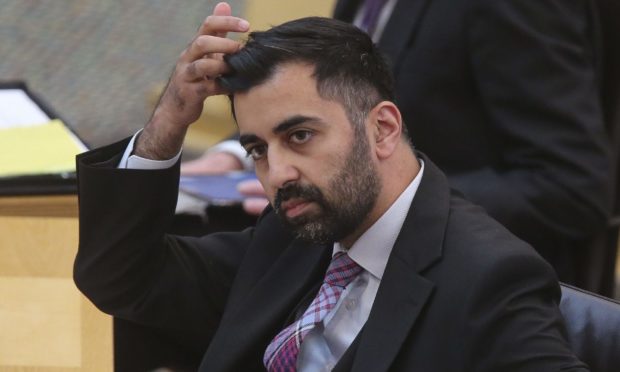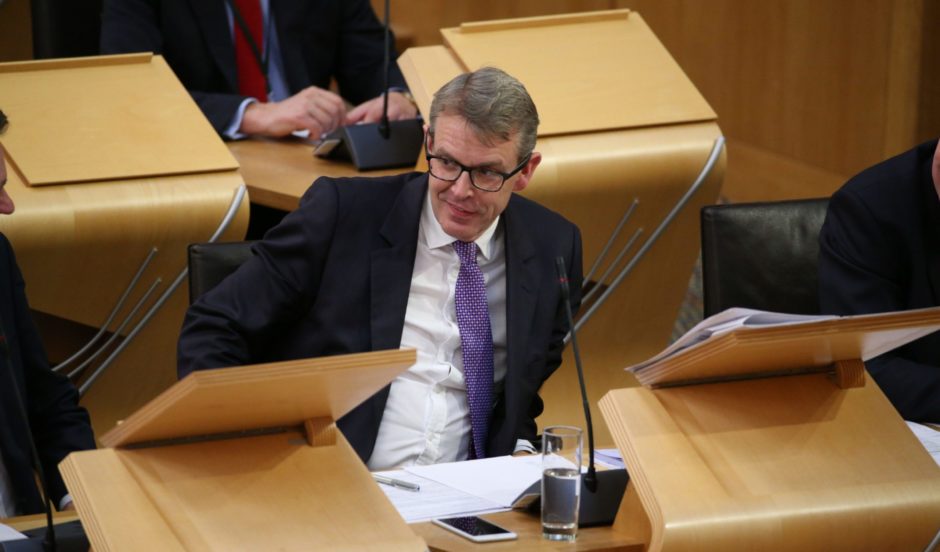The controversial Hate Crime Bill must be amended further, say MSPs scrutinising the legislation.
Justice Secretary Humza Yousaf has already announced plans to amend the bill after an outcry over proposals on offences of “stirring-up hatred”, which critics fear will stifle freedom of speech.
MSPs on Holyrood’s Justice Committee began hearing oral evidence in late October but have revealed they believe additional changes are needed.
After weeks scrutinising the proposed legislation, the committee has recommended the Scottish Parliament back the general principles of the bill “subject to those amendments being made”.
Convener of the committee, Adam Tomkins said the committee has proposed a “significant number of changes”, in addition to those put forward by Mr Yousaf.
Despite Mr Yousaf pledging to make amendments around the protection of freedom of speech, the committee wants provisions concerning the safeguarding of free speech to be “deepened and strengthened”.
MSPs have also argued for greater clarity on the reasonableness defence available to those who are charged with stirring up offences.
The committee argued that for behaviour to be considered “abusive” under the terms of the legislation, prosecutors must be required to show a “reasonable person” would consider this to be the case – claiming this would set a “higher bar” for prosecutions”.
Mr Tomkins said “balancing freedom of expression and legislating to ensure hateful actions can be prosecuted is a difficult task”.
He added: “We believe that, if amended in line with our unanimous recommendations, this bill should be fit to protect the communities it affords extra protections without encroaching on the ability of citizens to have robust debates, hold views others find unpalatable and express themselves freely.”
Mr Tomkins said it is “testament to the open-mindedness of all members” that the committee had “found such consensus on what has undoubtedly been a contentious piece of legislation”.
Justice Secretary Humza Yousaf has said he welcomes the “unanimous agreement” from the committee to support the general principles of the bill if further amendments are brought forward.
He will give the formal Scottish Government response on Monday, ahead of the legislation being debated in parliament on Tuesday.
What amendments to the legislation have already been announced?
On September 23 Justice Secretary Humza Yousaf set out a number of amendments that the Scottish Government proposes to lodge at stage 2.
These include:
- Intent only: To make the new stirring up hatred offences in part two of the bill “intent only”. This change would not apply to offences in relation to stirring up racial hatred where liability based on intent or likelihood of hatred being stirred up would continue to apply.
- Freedom of expression clauses: To consider provisions concerning freedom of expression.
- “Malice and ill-will”: To give further consideration to certain aspects of the language contained in the bill such as “evincing malice and ill-will”.
- Removal of plays: Removal of section four of the bill, which makes provision for certain people associated with the public performance of a play to be held criminally liable for committing an offence of stirring up hatred.
What further changes have the Justice Committee called for?
The Justice Committee has proposed a “significant” number of changes.
Convener of @SP_Justice Cttee @ProfTomkins speaks about the Cttees Stage 1 report on the Hate Crime & Public Order (S) Bill. See the report here: https://t.co/eBLO4nw9G6 pic.twitter.com/RYd7ZEQF2M
— Justice Committee (@SP_Justice) December 10, 2020
- Freedom of speech: MSPs want provisions concerning the safeguarding of free speech to be “deepened and strengthened”. The Justice Secretary has indicated he is open to considering this at stage two. The committee has called on him to set out how section 12 (which covers freedom of expression) should be amended.
- Definition of abusive: The committee believes it is important that the bill makes it clear that, for the test of ‘abusive’ to be met, the Crown would be required to show that a reasonable person would consider the behaviour to be abusive.
- Clarity on the reasonableness defence: Call for more clarity on the “reasonableness” defence available to those who are charged with “stirring-up” offences.
How has Justice Secretary Humza Yousaf responded?
Justice Secretary Humza Yousaf said the Scottish Government will give the recommendations “full consideration” ahead of Holyrood debating the bill on Tuesday.
He said he hopes MSPs “can listen to the voices of those affected by hate crime and come together to support the general principles of this legislation”.
I welcome @SP_Justice Stage 1 Report on Hate Crime Bill, unanimous agreement to support General Principles of Bill if further amendments brought forward – many I have already agreed to. Much to be welcomed in Report, will give formal SG response on Monday before Tuesday's debate
— Humza Yousaf (@HumzaYousaf) December 10, 2020
Mr Yousaf added: “The parliamentary debate will provide the opportunity for MSPs to find consensus on how we collectively and effectively tackle hate crime, working together to ensure Scotland is an inclusive and forward-thinking society that safeguards all of its people and communities.”
How have free speech campaigners reacted?
Jamie Gillies, spokesman for the Free to Disagree campaign, which supports dropping the ‘stirring up hatred’ offences entirely, welcomed the committee’s findings.
However, the group would like to see additional changes made to “increase public confidence” in the proposals.
He said: “They’ve clearly taken the concerns of stakeholders, including members of our campaign, on board in urging sensible amendments to the controversial stirring up hatred offences.
“It’s particularly good to see a call for more clarity on the subjective terms ‘abusive’ and ‘inflammatory’ and a ‘deepening’ of free speech provisions. Amendments along these lines will help to mitigate the threat to free expression described by so many groups over the last six months.
“There are other changes we wish to see. A specific free speech clause on transgender issues is crucial. We’d also like to see a dwelling defence, protecting speech in the privacy of the family home. If MSPs adopt these added safeguards, they will increase public confidence in the proposals.”


